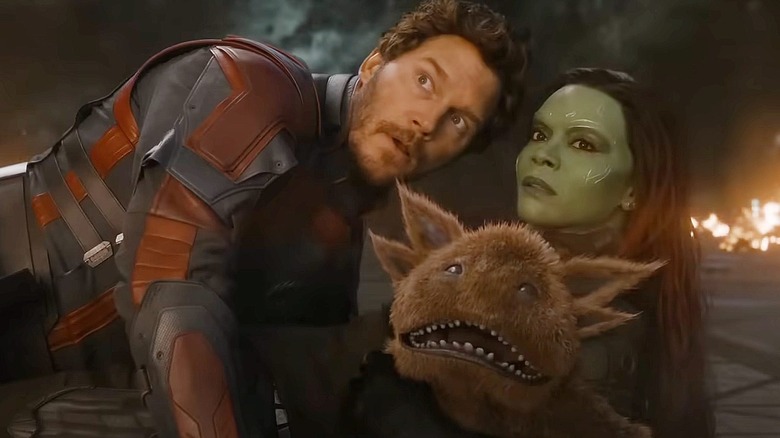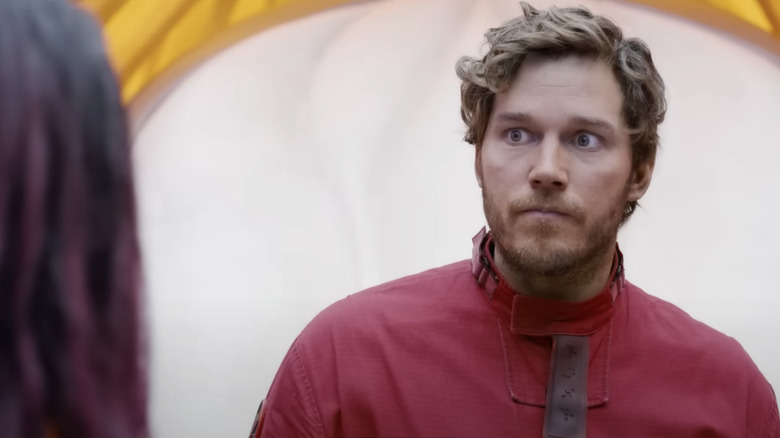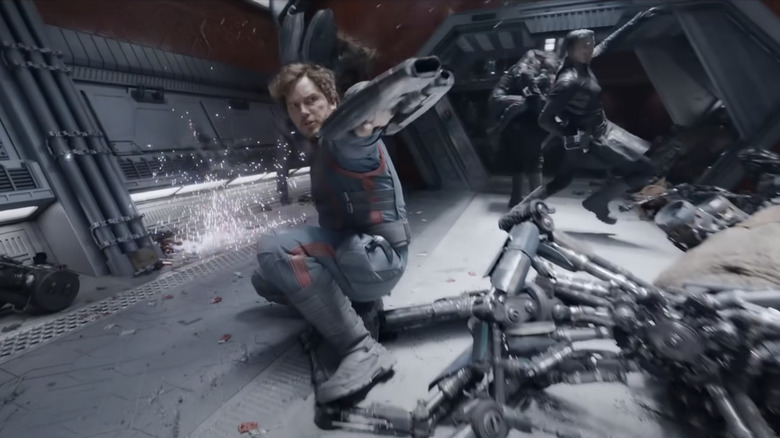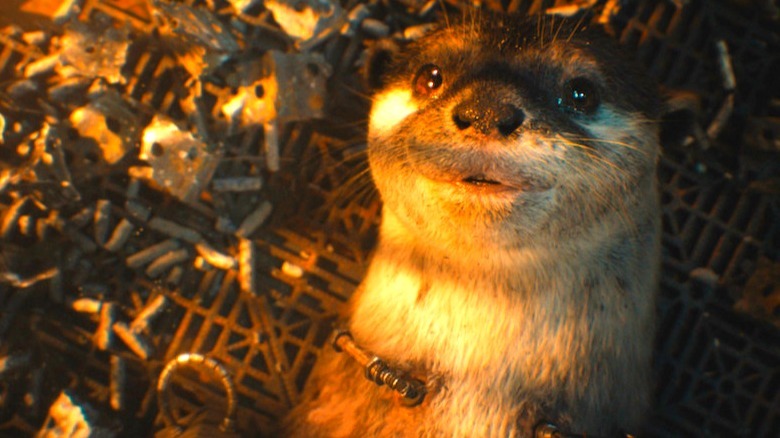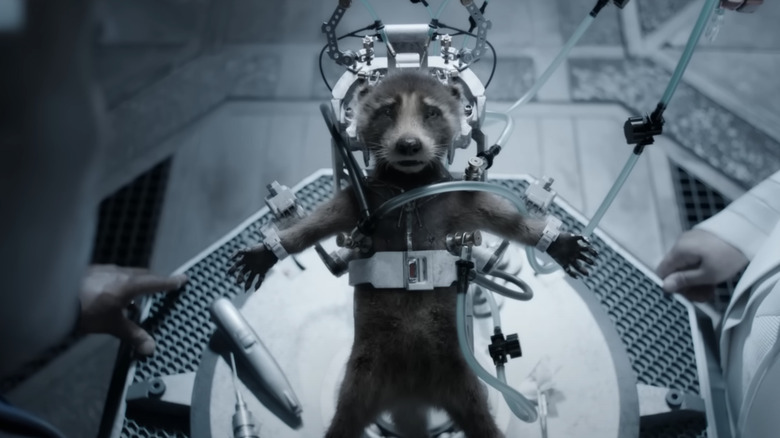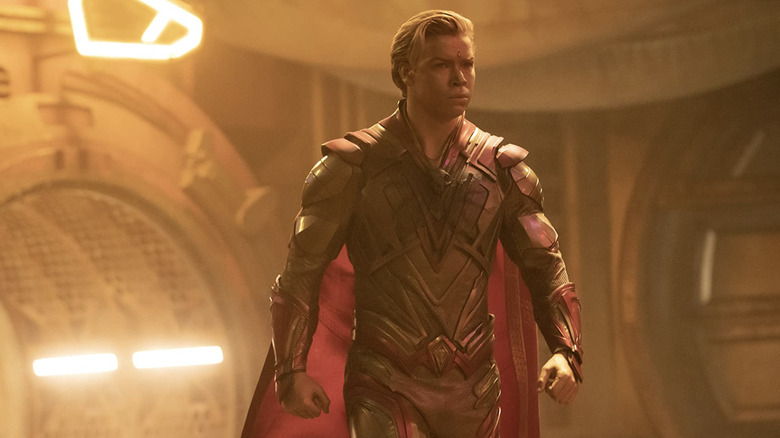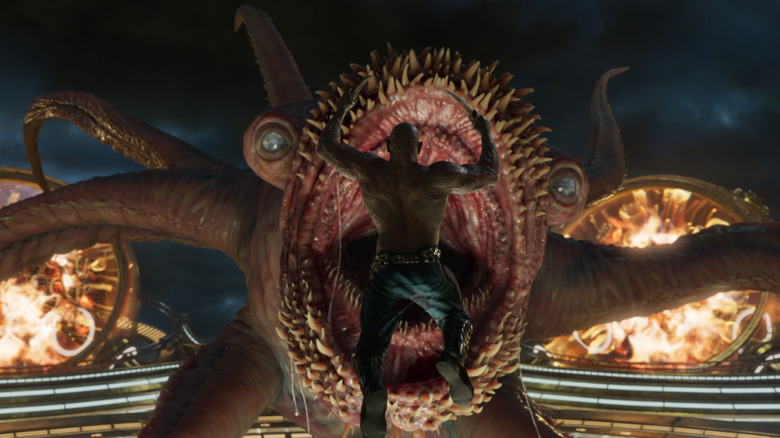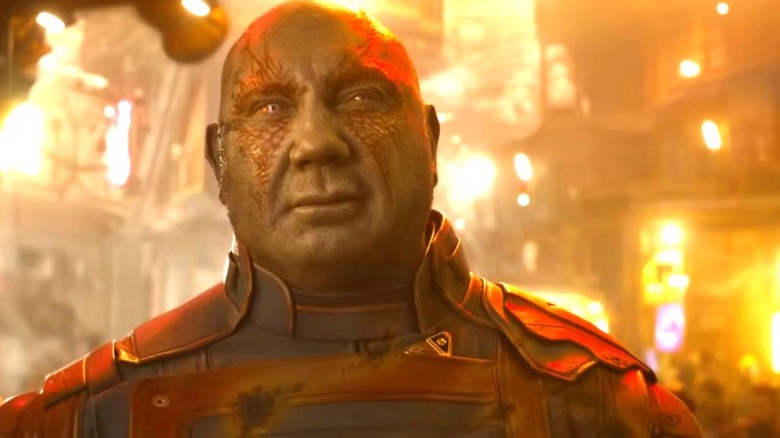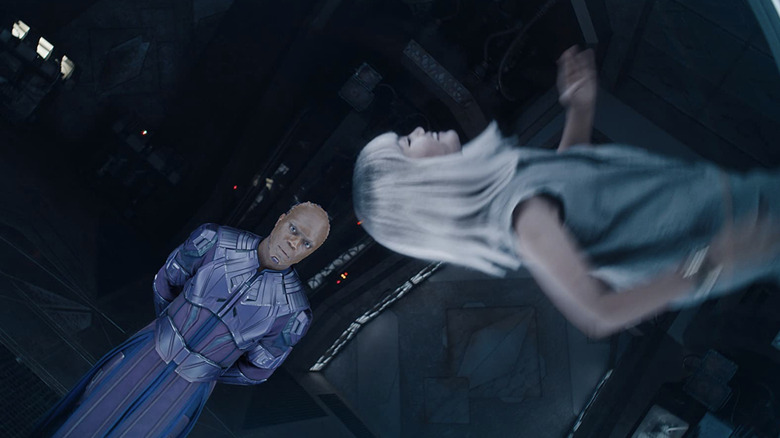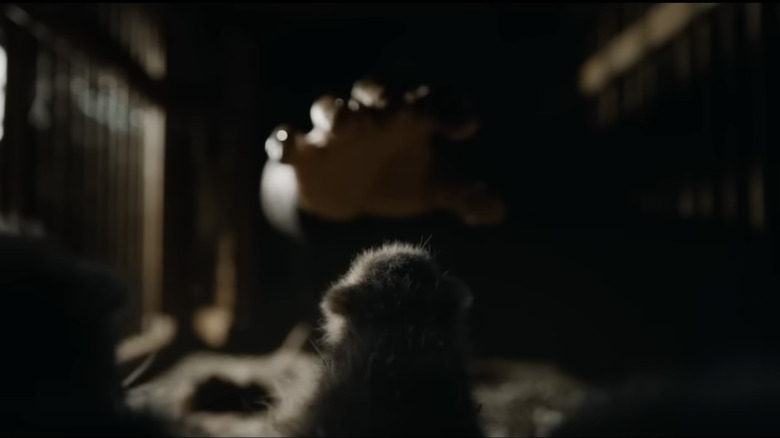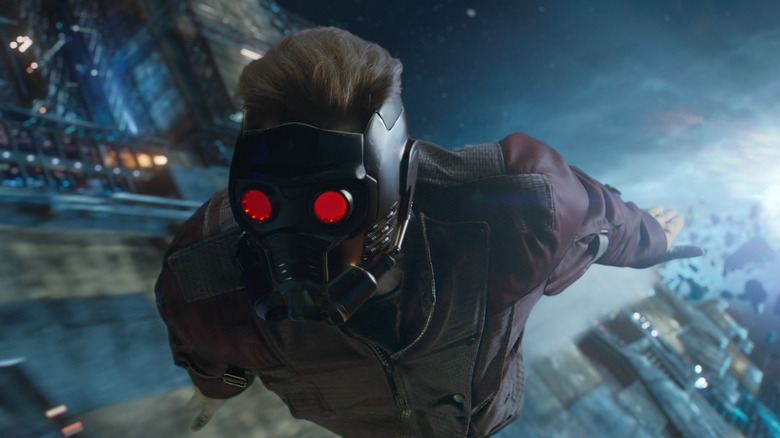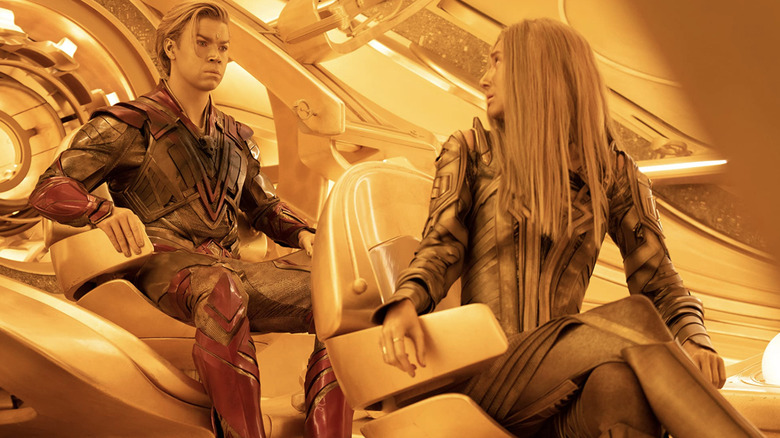Guardians Of The Galaxy Vol. 3's Biggest Plot Holes
With "Guardians of the Galaxy Vol. 3," fans and critics received the space-adventuring trilogy's final installment with goodwill-fueled excitement and praise.
The film holds a certified fresh score on Rotten Tomatoes from critics (82%) and audiences (95%), but perhaps that's indicative of the notion that people love Star-Lord, Drax, Rocket and the rest of these old friends more than it is the film's flawless narrative and craftsmanship.
"Guardians" mastermind James Gunn is unquestionably a talented writer and director; nevertheless, in "Vol. 3" some of the choices he makes in favor of frivolity or character development (as opposed to plot and continuity) leave the door open for some confusion and perhaps even plot holes. This point was illustrated by Gunn himself the day after the film's release, when he opened himself up to "yes/no" questions from fans — and many who'd seen the movie still needed crucial plot points further explained.
While "GotG3" gave a beautiful send-off to several beloved characters, and left viewers with a lot of potential new storylines to look forward to, here are some of the nagging questions left dangling by Gunn's final story for the MCU.
Why is Quill on a bender?
"GotG3" opens with a great set piece. Rocket walks slowly through Knowhere (A.K.A. the current headquarters of the Guardians of the Galaxy) humming along to Radiohead's acoustic recording of their 1992 hit "Creep." He passes by most of the other Guardians, who are assisting the local citizenry; eventually he comes upon Peter Quill, who is passed out drunk. Nebula then comes to collect Quill and bring him to his bed so he can sleep it off. With one word, the state of affairs is summed up nicely: "Again?"
As she's putting him to bed, Nebula hears Quill pining for Gamora. Peter and Gamora fell in love over the course of the first two "Guardians" movies, and Thanos killed that version of her. Even though another version of his paramour crossed into their universe and remained after helping the Guardians end the Infinity War, the Gamora that Peter once loved is gone.
Peter has shown himself to be relatively high functioning and normal in appearances since "Avengers: Endgame," including the opening scenes of "Thor: Love & Thunder" and in "The Guardians of the Galaxy Holiday Special." Which is why it's a little confusing that, after those times when he seemed much more healed in the wake of Gamora's death, he's now black-out drunk and drowning his sorrows.
The best explanation of this plot hole? People don't grieve in a straight line. Peter has good days and bad days, and "GotG3" opens with a bad one.
How did Quill recover so quickly?
Speaking of Quill's drinking, how was he able to shake off his drunkenness so quickly when Rocket was attacked? If Quill's bender were a one-time thing, it might make sense that he rallied via a combination of adrenaline and conditioning, but all indications are that Quill has been in the gutter for some time. It's reminiscent of Randy Quaid in "Independence Day," who spends half his scenes drunk, then shows up to save the day, sober as a schoolmarm.
Chris Pratt, the actor who plays Peter Quill, was 43-years-old at the time of the film's release and even though Peter's exact age is unknown, it can be assumed he's in the same neighborhood. Quill— the mighty Star Lord— is no spring chicken. Regularly imbibing large amounts of alcohol can take a toll on any body, especially on someone who's over 30. As soon as Quill realizes that Rocket needs help, however, he snaps into action, then is never again seen struggling with symptoms of withdrawal or possible alcoholism.
Okay, perhaps viewers need to just suspend disbelief; nevertheless, it feels like when the plot needs Quill to be a drunk, he is one — and when the script requires a hero, he is one.
How did Lylla come up with her name?
After Rocket gains sentience from the High Evolutionary's brutal experiments, he is thrown into a cell with three other scientifically modified animals who become his friends and only true source of comfort. This is seen in flashbacks, as Rocket clings to life and reflects on his past.
The four animals (a white rabbit, a walrus, an otter, and Rocket) are laying down in a circle one day when the otter announces that she's been thinking, and she has decided she wants her name to be Lylla. Lylla then encourages the rest of them to come up with their own names and they do. The walrus decides to call himself Teefs (because of his big teeth), the rabbit decides to call herself Floor (because that's what she's looking at when she tries to think of a name), and Rocket selects his name because he heard the High Evolutionary use that word.
But wait: How did that otter come up with a random name like Lylla? With 3 L's, no less? The animals in Batch 89 have a limited knowledge, essentially only what was granted to them by the High Evolutionary's experiments; she is the only one who doesn't give any explanation as to where she got her name. Best guess for the reason why this plot hole is in "GotG3"? Well, she's been Lylla in the comics since 1982.
Why were all of the High Evolutionary's specimens from Earth?
Around the midpoint of "Guardians of the Galaxy Vol. 3," viewers learn from the High Evolutionary that he visited Earth once and admired the spirit and culture of the human race. He decided to build his human/animal society on a planet called Counter-Earth that would resemble the big blue marble, but fix everything wrong with the original. But if the High Evolutionary only visited Earth one time, and was inspired by human culture and society, why did he decide to only use Earth specimens?
Theoretically, his idea to create the perfect species — running living things through millions of years of biological evolution over the course of a few seconds — could be done with any living creature, not just those found on Earth. As the MCU (and particularly, the "Guardians" films) has show repeatedly, there are fascinating, complicated beings with great potential across the galaxies.
Nevertheless, every human/animal experiment seen in "GotG3" is something that was originally an Earth animal. It would be different if the High Evolutionary was specifically fascinated by the biology of living things on Earth, but that wasn't what he liked about the planet. He talks admiringly of Earth's art and culture, then says he made the human/animals and built their society and culture around it.
Also, his one trip to Earth was enough to appreciate all art and culture, be inspired with this grand idea and take enough specimens to do his experiments? Seems a little far-fetched.
Are the Sovereign actually incapable of imagination?
At another point in "GotG3," the High Evolutionary meets with Ayesha and Adam of the Sovereign people — a race that played a substantial role in "Guardians of the Galaxy Vol. 2." The High Evolutionary tells them that he created the Sovereign as a purely aesthetic project and that they're all... well, idiotic. It's not a very nice thing to say (even if the Sovereign are pretty dense), but it's also confusing.
In "GotG3," the High Evolutionary complains that the only being capable of independent and creative thought that he has ever created is Rocket, which is why he's so obsessed with reacquiring him. This makes some sense, until you remember that the Sovereign are a thriving race of technologically advanced people. Certainly the High Evolutionary can give any of his creations the ability to create anything he can make himself, but does that mean the High Evolutionary created Adam?
In one of the "GotG2" post-credit scenes, Ayesha is seen discussing her defeat at the hands of the Guardians with a handmaiden. She shows her maid a new kind of birthing pod and says, "that, my child, is the next step in our evolution. More powerful. More beautiful." Doesn't that prove that the Sovereign have created something newer and better? It's possible that the High Evolutionary was the one responsible for Adam's creation, but he's also the one who removed Adam from his pod early in order to capture Rocket.
Why were there abilisks in the pit?
Another callback to "Guardians of the Galaxy Vol. 2" happens when Mantis, Drax, and Nebula find themselves imprisoned in a dark pit filled with abilisks. In the opening scene of "GotG2" (pictured above), the Guardians are seen protecting the Sovereign's Anulax batteries from an abilisk. Why are they protecting batteries from the abilisk?
"They eat batteries," says Mantis in the third film. "Not people."
Mantis points this out to Nebula and Drax when they find themselves surrounded by three angry abilisks. She approaches one of them and uses her powers to help it calm down, which in turn helps the other two abilisks chill out. After that, Nebula, Drax, and Mantis each have an abilisk mount upon which to escape, and it turns out pretty well for every living thing in the pit.
The thing is, why would a genius biochemist like the High Evolutionary fill his dungeon pit with abilisks? Yes, they are big and menacing, but they don't eat people, so they don't make sense as would-be-Rancor monsters. Does the High Evolutionary not know that abilisks only eat batteries? he seems like a pretty smart guy, and this seems like a problem that could have been solved with some simple biological awareness. It would be like building a moat around your house and filling it with goldfish.
Sure, the abilisks were spooked and aggressive at first. But wouldn't it be a safer bet to put a few carnivores down there?
How did Drax know the language spoken by the children?
Drax, Nebula, and Mantis encounter another attempt by the High Evolutionary to create a new ideal species, consisting of mostly-humanlike (save for some facial markings) children with silver hair. The children speak a different language from that of the human/animals, and the Guardians are unable to speak it.
Nebula and Mantis try to get the children to stay away from a soon-to-be-under-siege side of the ship, but they cannot explain themselves. Suddenly, Drax comes up from behind and speaks gently to the children in their own language. When Nebula asks him why he didn't tell them he could speak the language he says, "you never asked."
Of course, those three words themselves have become something of a Hollywood cliche over the years. But looking beyond that, is the lack of any follow-up a plothole?
This interaction actually does serve a purpose in the development of Drax and Nebula from a characterization and personal arc point of view. Before this moment, Nebula and Mantis had a fight about how Drax is dumb and useless, and often gets them into extra trouble. Nebula failing to ask Drax if he knew the language is meant to serve as an example of Nebula underestimating Drax's value, but that doesn't hold much water.
Rocket and the other Guardians are Drax's friends too — why would he not volunteer such important information about his linguistic skills in all their previous missions together? Also, how does he even know this dialect, if these children are a brand-new species engineered by the High Evolutionary?
Where exactly did these children come from, anyway?
Speaking of the High Evolutionary's brand-new species (introduced in a nice "2001: A Space Odyssey" homage, pictured above), where exactly did they come from?
While the human/animals were genetically engineered by the H.E., originating as everyday animal specimens from Earth, is the implication that the High Evolutionary kidnapped Earth children, then enhanced their own evolutionary progress by millions of years? Or did he create them from scratch using nothing but rudimentary, organic tissue? The first seems cruel beyond measure, even for him; the second seems beneath his intellect.
Drax's awareness of their language could indicate that these children came from a species that exists somewhere in the galaxy, almost certainly not Earth. But that also seems unlikely, since the High Evolutionary is so preoccupied with Earthbound creatures.
Another important thing to note about the children is that the High Evolutionary is dissatisfied with them. They're genetically perfect — super fast and capable of incredible mental capacity — but by the High Evolutionary's own admission, they're just as incapable of imaginative thought as any other being he's ever created (save for Rocket).
The Guardians rescue the children at the end of the movie, of course, because they're adorable little kids who deserve to live regardless of their genius potential, but what kind of lives will they lead without a capability for creative or inventive thought?
Perhaps the High Evolutionary will be proven to have been incapable of inspiring the ability to learn and think critically. That could be the ultimate denouement for a character who worked so hard to find perfection: it was under his nose the whole time, but overshadowed by his cruelty.
Why did the Guardians need Rocket's prompting to free the animals?
At one point in the film, the Guardians gain access to Rocket's Orgocorp files and find footage of the experimentation that he went through. The Guardians are, of course, horrified to see that their friend endured such horrors, and it further motivates them on their mission.
Near the end of the film, when the Guardians are facilitating the escape of the children from the Orgosphere, Rocket sneaks away to a room filled with Earth animal specimens — including a cage full of baby raccoons. This is where Rocket came from, and he is emotional as he works to release the animals. Rocket tells Quill that the Guardians need to save not just the children but also the animals, and Peter looks flummoxed.
Aside from the ensuing scene that might feel a bit familiar to fans of "Pee-Wee's Big Adventure," it leaves a lingering question: Why is Quill so confused about why Rocket wants to save these animals?
They may not be sentient like Rocket, but the only difference between them and Rocket is a boatload of agony. They are indeed living creatures, the Guardians are heroes, and they've also recently watched footage to make them aware of the hellacious lives these creatures have led in captivity.
Ultimately, the Guardians go with it. But even then, one of the Knowhere citizens remarks to Quill that he thought they were limiting their rescue to "higher life-forms," and instead of correcting him, Peter says, "so did I."
So, not only does Peter not understand why these animals are worth saving, but he can't understand why his friend Rocket would want to save them? It seems like the Guardians missed one of the biggest morals of the movie. All life is worthy of respect.
Where was Peter's helmet and rocket boots?
At the climax of the film, the Guardians watch as Peter falls behind, going back to rescue his beloved Zune. He finds a way to thrust himself halfway into space toward Knowhere, but is unable to achieve enough velocity to propel himself all the way to safety.
As Quill floats in space, he seemingly succumbs to its conditions. His body swells and freezes, he seems to black out, and things do not look good for Star-Lord. But fortunately, Adam Warlock has come over to the good side, flying in at the last possible moment to save Quill from certain death.
Many folks will remember a scene similar to this one in "Guardians of the Galaxy Vol. 1," where Quill uses his helmet and rocket boots to launch himself into the space outside of Knowhere and rescue Gamora, whose ship has exploded. Quill, in a key moment of self-sacrifice, gives her his helmet, then begins to succumb to the cold of space.
So where was his helmet and rocket boots this time? It's a question Gunn seems likely to be answering for years.
"Did you forget about Peter's rocketboots and helmet?" a fan asked on Twitter when the film came out. "No," replied Gunn.
"It's in his desk drawer in Knowhere," Gunn later expanded when asked again. "He had to get out of there fast as you know! (And as for the next question people ask — the rockets that clip onto his boots are far inferior to the jet packs Rocket has made them so they're not around at all anymore)."
While Adam's involvement in Quill's rescue is important in cementing him as a hero and new member of the Guardians, it's pretty frustrating that there was an easy way out of danger for Quill — but he just forgot to pack accordingly.
Why doesn't Adam return to the Sovereign?
Throughout "Guardians of the Galaxy Vol. 3," Adam Warlock and his creator, Ayesha — whom he refers to as 'mother' — are scrambling to capture Rocket and please the High Evolutionary. The High Evolutionary, viewers find out, was responsible for the creation of the Sovereign and their civilization, which were glimpsed in "Guardians of the Galaxy Vol. 2."
While the Sovereign aren't particularly clever, they do have advanced technology and a large population. Even though Ayesha is killed by the explosions that destroy Counter-Earth, much to Adam's devastation, he doesn't stop trying to capture Rocket even after her influence is gone. Presumably, this is because Adam still cares about the Sovereign and their continued existence (which the High Evolutionary earlier threatened).
Oddly, in the mid-credits scene after the movie, viewers see Adam Warlock sitting with Rocket and the rest of the new roster of Guardians. Obviously a time jump has occurred, so between the end of the movie and then, Adam has presumably contacted the Sovereign — and they didn't need him to return? Or, did he not want to return to his own people in their time of need? That seems even more unlikely.
It can be assumed, perhaps, that Adam has been won over by the Guardians, much like other unlikely allies who've come into their orbit. They're a group of fun, accepting, good people, and they make a great home in which to heal from trauma.
